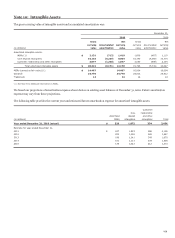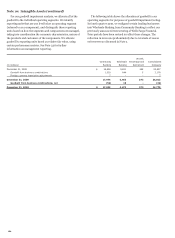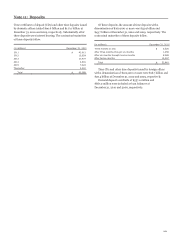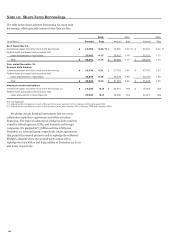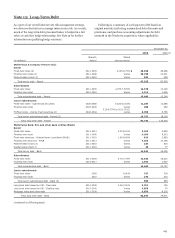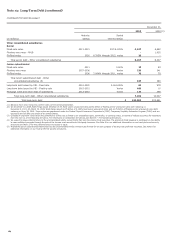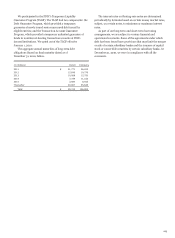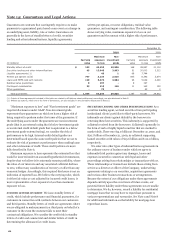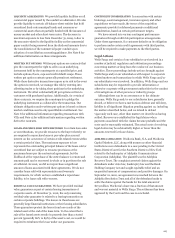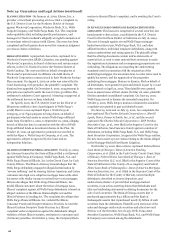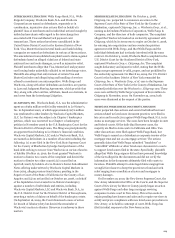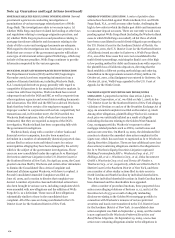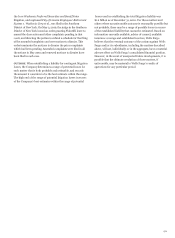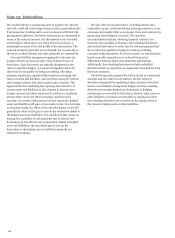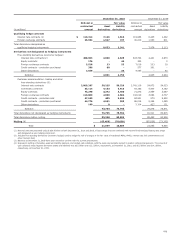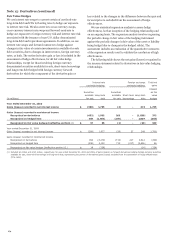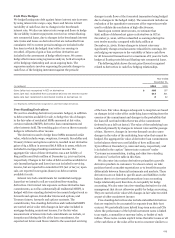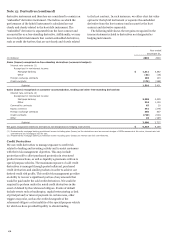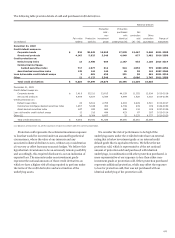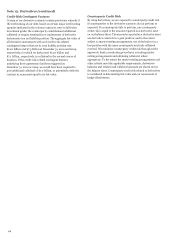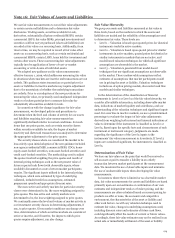Wells Fargo 2010 Annual Report Download - page 171
Download and view the complete annual report
Please find page 171 of the 2010 Wells Fargo annual report below. You can navigate through the pages in the report by either clicking on the pages listed below, or by using the keyword search tool below to find specific information within the annual report.INTERCHANGE LITIGATION Wells Fargo Bank, N.A., Wells
Fargo & Company, Wachovia Bank, N.A. and Wachovia
Corporation are named as defendants, separately or in
combination, in putative class actions filed on behalf of a
plaintiff class of merchants and in individual actions brought by
individual merchants with regard to the interchange fees
associated with Visa and MasterCard payment card
transactions. These actions have been consolidated in the
United States District Court for the Eastern District of New
York. Visa, MasterCard and several banks and bank holding
companies are named as defendants in various of these actions.
The amended and consolidated complaint asserts claims against
defendants based on alleged violations of federal and state
antitrust laws and seeks damages, as well as injunctive relief.
Plaintiff merchants allege that Visa, MasterCard and payment
card issuing banks unlawfully colluded to set interchange rates.
Plaintiffs also allege that enforcement of certain Visa and
MasterCard rules and alleged tying and bundling of services
offered to merchants are anticompetitive. Wells Fargo and
Wachovia, along with other defendants and entities, are parties
to Loss and Judgment Sharing Agreements, which provide that
they, along with other entities, will share, based on a formula, in
any losses from the Interchange Litigation.
LE-NATURE’S, INC. Wachovia Bank, N.A. was the administrative
agent on a $285 million credit facility extended to Le-Nature’s,
Inc. in September 2006, of which approximately $270 million
was syndicated to other lenders by Wachovia Capital Markets,
LLC. Le-Nature’s was the subject of a Chapter 7 bankruptcy
petition, which was converted to a Chapter 11 bankruptcy
petition in November 2006 in the U.S. Bankruptcy Court for the
Western District of Pennsylvania. The filing was precipitated by
an apparent fraud relating to Le-Nature’s financial condition.
Wachovia Capital Markets, LLC and/or Wachovia Bank, N.A.
are named as defendants in a number of lawsuits including the
following: (1) a case filed in the New York State Supreme Court
for the County of Manhattan by hedge fund purchasers of the
bank debt seeking to recover from Wachovia on various theories
of liability (On May 10, 2010, the Court granted Wachovia’s
motion to dismiss two counts of the complaint and denied the
motion to dismiss two other counts); (2) a case filed on
April 28, 2008, by holders of a Le-Nature’s Senior Subordinated
Notes offering underwritten by Wachovia Capital Markets in
June 2003, alleging various fraud claims, pending in the
Superior Court of the State of California for the County of Los
Angeles; and (3) an action filed on October 30, 2008, on behalf
of the liquidation trust created in Le-Nature’s bankruptcy
against a number of individuals and entities, including
Wachovia Capital Markets, LLC and Wachovia Bank, N.A., in
the U.S. District Court for the Western District of Pennsylvania,
asserting a variety of claims on behalf of the bankruptcy estate.
On September 16, 2009, the Court dismissed a cause of action
for breach of fiduciary duty but denied the remainder of
Wachovia’s motion to dismiss. Discovery is underway in these
matters.
MERGER RELATED LITIGATION On October 4, 2008,
Citigroup, Inc. purported to commence an action in the
Supreme Court of the State of New York for the County of
Manhattan, captioned Citigroup, Inc. v. Wachovia Corp., et al.,
naming as defendants Wachovia Corporation, Wells Fargo &
Company, and the directors of both companies. The complaint
alleged that Wachovia breached an exclusivity agreement with
Citigroup, which by its terms was to expire on October 6, 2008,
by entering into negotiations and an eventual acquisition
agreement with Wells Fargo, and that Wells Fargo and the
individual defendants had tortiously interfered with the same
contract. On October 4, 2008, Wachovia filed a complaint in the
U.S. District Court for the Southern District of New York,
captioned Wachovia Corp. v. Citigroup, Inc. The complaint
sought declaratory and injunctive relief, stating that the Wells
Fargo merger agreement is valid, proper, and not prohibited by
the exclusivity agreement. On March 20, 2009, the U.S. District
Court for the Southern District of New York remanded the
Citigroup, Inc. v. Wachovia Corp., et al. case to the Supreme
Court of the State of New York for the County of Manhattan, but
retained jurisdiction over the Wachovia v. Citigroup case. These
cases were settled by Wells Fargo’s payment of $100 million to
Citigroup in November, 2010. On November 23, 2010, both
cases were dismissed at the request of the parties.
MORTGAGE FORECLOSURE DOCUMENT LITIGATION
Seven purported class actions and several individual borrower
actions related to foreclosure document practices were filed in
late 2010 and in early 2011 against Wells Fargo Bank, N.A. in its
status as mortgage servicer. The cases have been brought in state
and federal courts. Of the individual borrower cases, the
majority are filed in state courts in California and Ohio. Two
other class actions were filed against Wells Fargo Bank, but
Wells Fargo is named as a defendant as corporate trustee of the
mortgage trust and not as a mortgage servicer. The actions
generally claim that Wells Fargo submitted "fraudulent" or
"untruthful" affidavits or other foreclosure documents to courts
to support foreclosures filed in the state. Specifically, plaintiffs
allege that Wells Fargo signers did not have personal knowledge
of the facts alleged in the documents and did not verify the
information in the documents ultimately filed with courts to
foreclose. Plaintiffs attempt to state legal claims ranging from
wrongful foreclosure to deceptive practices to fraud and seek
relief ranging from cancellation of notes and mortgages to
money damages.
On December 20, 2010, the New Jersey Supreme Court, the
New Jersey Administrative Office of the Courts, and the Superior
Court of New Jersey for Mercer County jointly began an action
against Wells Fargo and other large mortgage servicing
companies in state court in New Jersey. This action seeks to
enjoin pending foreclosures and sales and to require servicers to
certify and prove compliance with new foreclosure procedures in
New Jersey, or be held in contempt of court. Wells Fargo has
filed its initial response to the New Jersey action.
169


